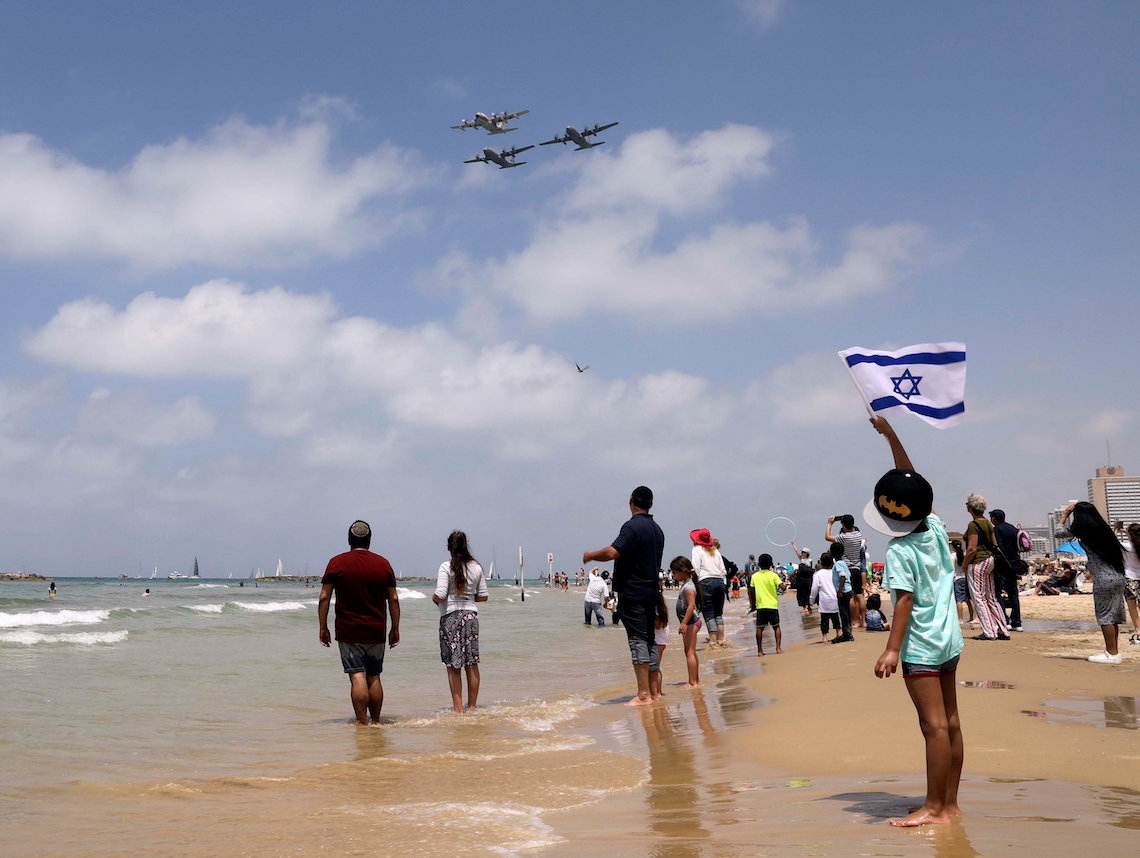 People watch the Israeli Air Force planes fly in formation over the Mediterranean Sea on May 2. Photo by Ammar Awad/Reuters
People watch the Israeli Air Force planes fly in formation over the Mediterranean Sea on May 2. Photo by Ammar Awad/Reuters Next week, Israelis will mourn on Memorial Day and celebrate Independence Day the following day. But these observances will be unlike previous observances.
On Memorial Day eve, schools won’t hold their customary assemblies attended by entire neighborhoods. On Memorial Day (Yom HaZikaron), cemeteries, which usually are packed with families, schoolchildren, soldiers, citizens — must remain relatively empty. On Independence Day (Yom HaAtzmaut) eve, torches will be lit in an empty theater on Mount Herzl during the official opening day ceremony. Idan Raichel, a brilliant musician, will light one of the torches. Galia Rahav, head of infectious diseases at the Sheba Medical Center, will light another one. Tzipi Shavit, a legendary entertainer, will light a torch. My heart goes out to Shavit. She is the one I can’t even imagine without a cheering crowd.
On Memorial Day (Yom HaZikaron), cemeteries, which usually are packed with families, schoolchildren, soldiers, citizens — must remain relatively empty.
I know quite a bit about these torches. My father, now in his 80s, worked as a mid-level government official for most of his career. Among the many mundane tasks that he performed, there was one that seemed quite glorious even to his unimpressed children. Every year, for about 30 consecutive Independence Days, he was in charge of the texts that 12 torch lighters recited during the ceremony on Mount Herzl.
The text has a certain format. Every torchbearer introduces himself or herself, explains why he or she is kindling the torch, and ends with the words every Israeli can recite: “To the glory of the State of Israel.” It sounds simple but it’s not. Torchbearers are often stubborn, opinionated people. They want to say a lot when the time allocated for each is limited. They want to speak their truth in a ceremony that must remain civil and unifying. Drafting the texts is the work of a writer and a diplomat. My father isn’t known to be patient, so I’m still not sure how he did it (asking him doesn’t help).
Lighting a torch on Independence Day is one of the great honors the state bestows on deserving citizens. In 2010, a supreme court justice, a businesswoman-philanthropist and the first Ethiopian doctor were among the participants. In 2015, a supermarket ceremony included a supermarket magnate, a pioneering feminist and an important Mizrahi music lyricist. Last year, the charismatic mother of a slain soldier, a space-exploration entrepreneur, a Paralympic basketball player were honored. You get the idea.
Because my father was involved with this ceremony, I attended a few of them as a child. Don’t underestimate that privilege. The ceremonies are packed, as are all general rehearsals. Tickets are hard to get and most Israelis get to see the torches lit only on TV (this is one of Israel’s most-watched TV programs). Of course, I don’t much remember the specific ceremonies that I attended — except for one. In 1979, Paul Michael Glaser of the hit TV series “Starsky & Hutch” was a guest of honor. I remember his entrance, and the crowd’s cheer. He was probably the first true celebrity I met.
Yom HaAtzmaut is a celebration of a nation, not a family. It is a celebration made for city squares and amphitheaters, for parties and shows, for fireworks and beer. We mourn together — we dance together.
The virus is testing us. We were forced to celebrate Pesach in small groups. This was somewhat strange but also somewhat special. Pesach is a family holiday, and for people like me, with two children still at home, the seder was intimate and not without its magic. Yom HaAtzmaut is a different story. It is a celebration of a nation, not a family. It is a celebration made for city squares and amphitheaters, for parties and shows, for fireworks and beer. We mourn together — we dance together. On Independence Day, most of us celebrate while having a barbecue with family and friends (63% say they usually do). The virus will corrupt our Independence Day more than it corrupted Pesach.
The virus forces us to think about the concept of a nation and its meaning. The coronavirus epidemic, as many commentators observed, mostly disapprovingly, is when “the nation-state is making a comeback,” when “national interests are winning out,” when “nation-states increasingly are in the driver’s seat and being strongly supported by their populations.” The warnings deserve their due — because nationalism can become dangerous. But so is the belief that relying on the nation is irreplaceable. Internationalism often fails to connect with the needs and the fears of the public.
The virus forces us to think about the concept of a nation and its meaning.
Independence Day is a reminder that people have such a need. Independence Day under the coronavirus threat is a reminder that no person is an island.
Shmuel Rosner is the Journal’s senior political editor.






















 More news and opinions than at a Shabbat dinner, right in your inbox.
More news and opinions than at a Shabbat dinner, right in your inbox.